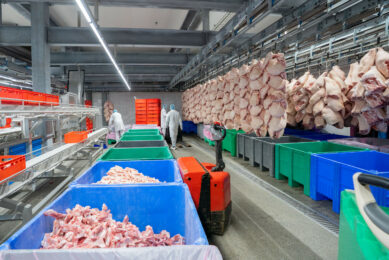Novel swine vaccine approved in China – control boar taint
Chinese swine producers have been given the go-ahead to use Improvac, the novel vaccine that is used in other major swine-producing markets as an alternative to physical castration for the control of boar taint.
The Chinese Ministry of Agriculture has approved the use of the pork production technology on pork farms in mainland China following a review of the evidence base.
According to the report of the Chinese Ministry of Agriculture for the registration of Improvac, the use of the vaccine can benefit producers in a number of different ways, including a significant reduction in back fat (14.6%), and 1.3% more lean meat recovered from each carcass. Improved feed efficiency (reduced feed/gain ratio from 2.32 to 2.17) could potentially save more than 8kg of feed per pig at typical Chinese slaughter weights.
“The Chinese pork chain, like many other global pork chains, has been facing severe price pressures in recent times,” said Zhao Bao Wen, the president of China Animal Agriculture Association. “There is a general feeling that we need to find better, more animal and environmentally-friendly ways to rear male pigs without compromising on meat quality. Swine producers in China need to apply more advanced technologies to assist quality enhancement.”
Various factors, including increasing feed costs, demands to increase harvest weight, and competition for labour as a result of booming urbanization have all contributed to a reduction in the competitiveness of pork production.
“This shift in the marketplace has coincided with the registration of Improvac,” added James Lee, who is responsible for New Product Marketing and Global Market Research at Pfizer Animal Health, manufacturer of Improvac. “Improvac is a novel, new immunological vaccine to control ‘boar taint’, the unpleasant smell that you get when some boar meat is cooked. It is safe and effective, while offering advantages to farmers and to the environment.”
Boar taint
In the past boar taint has been reduced by castrating male piglets in the first week of life. However, as well as increasing mortality, this procedure also means that the pig does not grow like a normal boar, requiring more feed for every kg of carcass produced. It also results in a carcass with a higher fat: lean ratio.
Studies have shown that the use of an immunological product to control boar taint helps lessen the environmental impact of pig production and contributes to sustainable pig farming. Improved feed conversion efficiency means less feed is consumed by boars, in turn reducing the amount of land and fertilizer required to produce feed. It also means that less manure is produced, which results in producers having to dispose of less waste.
Improvac works by stimulating the pig’s immune system to produce antibodies which reduce the amount of taint in the meat. Male pigs show normal boar-like growth until the second dose of vaccine is administered a few weeks before slaughter. The lack of any harmful residues means that Improvac has a zero meat withdrawal period.
“Improvac has been safely administered to over 14 million pigs for more than 12 years. With experience in Australia, New Zealand, South Africa, Brazil, Mexico, Europe, Japan and other countries, consumers around the world have benefited from the pork produced using the immunological product,” commented Lee Chun Feng, vice president of the Chinese General Administration of Quality Supervision, Inspection and Quarantine.
Pfizer Animal Health plans to train and assist veterinarians and their pork producer clients on the use of Improvac from the end of this year.
Related website:











